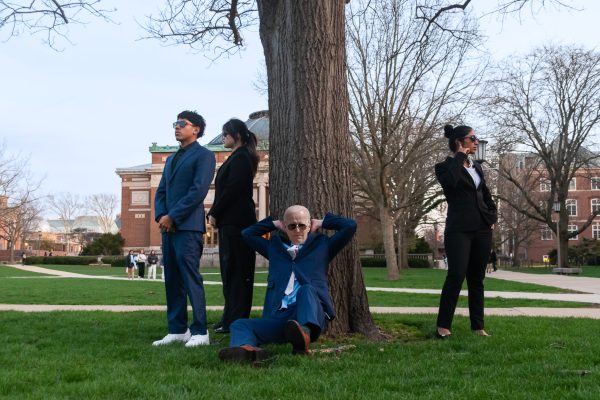Dealing with death: Part two
April 19, 2007
For once in my short career as an opinions columnist at the Daily Illini I’m at a loss for an opinion. Just a few weeks ago I wrote a column about obituaries and death in response to the deaths of a few important people, both internationally and personally. Today, several weeks later, this column resonates more than ever. I can’t help but talk about it again, though frankly I have nothing profound to say, and nothing substantial to add. I just can’t get it off my mind.
I spent a long time in my last column thinking about how obituaries ease the horror of death, particularly when famous, canonically important people pass away.
On April 11 Kurt Vonnegut, arguably one of the most important novelists of the 20th century, died of irreversible brain injuries.
Just Monday, 33 people died in a tragic shooting at Virginia Tech.
In Iraq today, 171 people died in a car bombing. Hundreds more die every week from a range of sources so diverse and terrifying that it is painful to imagine.
Get The Daily Illini in your inbox!
In Malatya, Turkey, three employees of a publishing company had their throats slit for distributing copies of the Bible.
Sixty-two more people have been killed in Darfur today due to the ongoing civil war there.
This has all happened in the confines of the past week, mostly in the past couple days.
Looking for meaning in all this death is now officially an uphill battle, one that doesn’t seem to be showing signs of relenting. No obituary, remembrance, vigil, kind word or column can even begin to encompass the gravity and horror of what we’re witnessing on our TV screens and in our newspapers on a daily basis.
Moreover, there’s no making sense of all this madness. Psychosis, fanaticism, terrorism, violence, disease – these things are largely outside of the control of (or perpetrated by) government and religion and watched in horror by the rest of us.
I’d like to write a column with a serious proposition for world peace and universal love. But it seems like all I can do at a time like this is make sure to be nice to people (as trite, pointless, or predictable as that is). Nice enough to refrain from shooting, nice enough to refrain from stabbing, bombing, or ethnically cleansing them.
In my last column I mentioned remembrance of a good life lived as one of the ways I cope with the inevitability of death. But now, with the deaths of swaths of children and college students it seems all I can look to for optimism in a sea of inevitable tragedy is the hope that things can better after they get worse, that compassion still matters on a daily basis, and that some good will come of the understanding that the world can be a cruel and dangerous place.
Kurt Vonnegut talks about death in almost all of his novels – they often concern the absurdity of war and conflict. One line, used more than once throughout his novels, Vonnegut uses as an epitaph for his characters.
It states, plainly, “Everything was beautiful and nothing hurt.” This is all I can hope that the countless victims of recent tragedies felt.
Let us remember this week as a warning about everything unimaginable that we can become.





